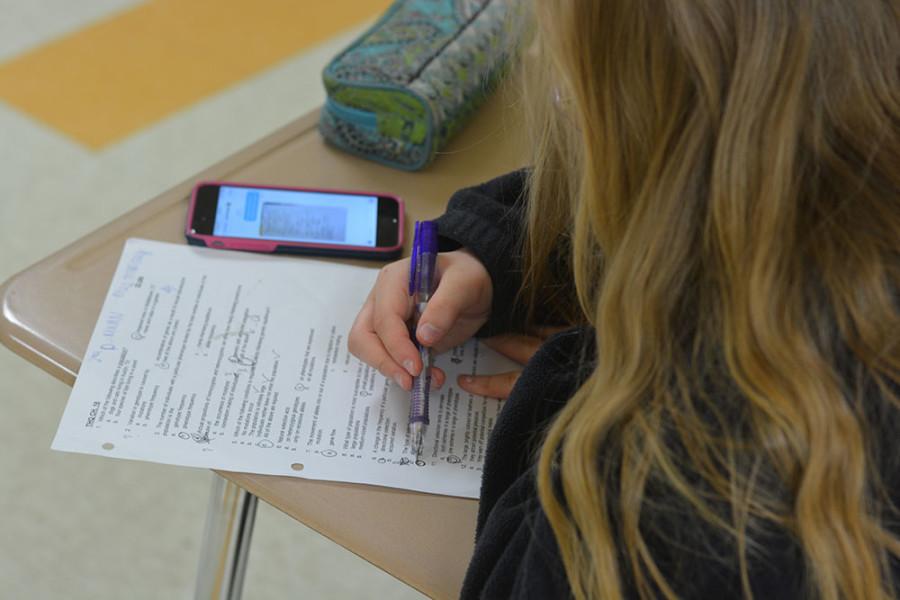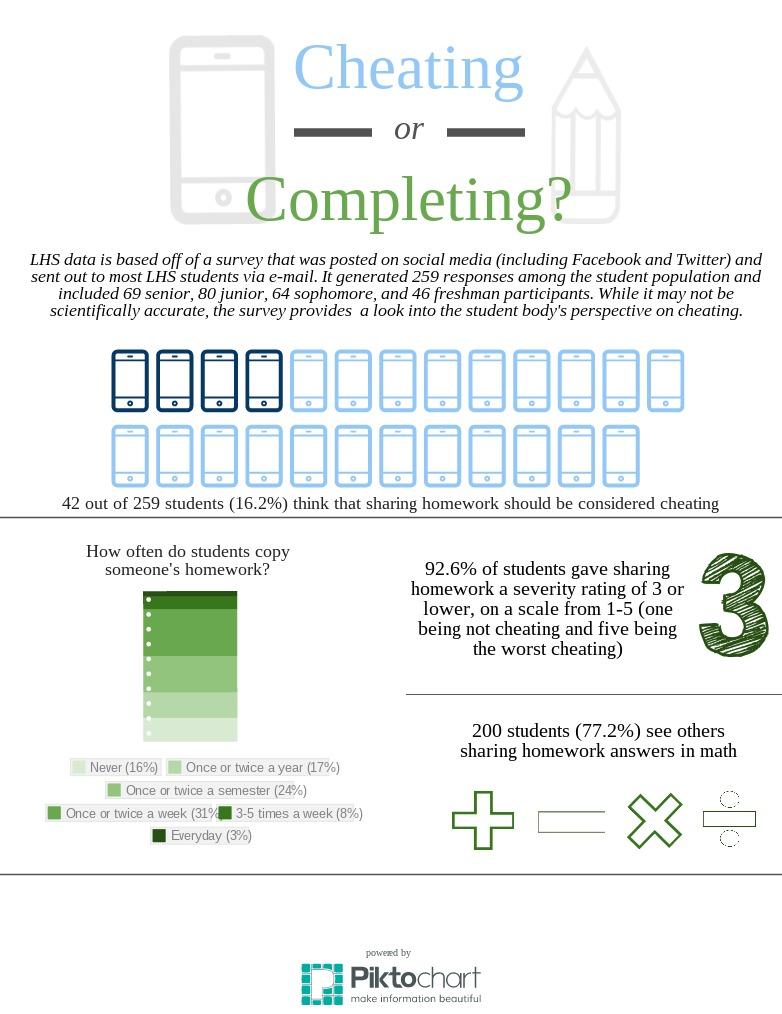It’s a Wednesday night. After getting home late from an away game, you have little energy to get anything done. While eating dinner, you painfully go through the long list of assignments that need to be completed for the next day in your head, and the overwhelming list causes you to roll over on your couch and pray that something magical might happen. You just wish that there was a way to press a button in your room and all of your homework would be completed.
Your phone buzzes beside you and you realize there may not be a magic button, but you certainly have magically smart classmates who just happen to have phones. And cameras. The ability to send pictures via text…
Before you realize it, half your homework is done by just looking at pictures on your phone’s screen. It takes you half the time to finish the rest of your homework, but then the question pops into your head… “Did I just cheat?”
“Cheating and Libertyville High School”
As technology continues to expand and provide widening opportunities to students, it had become easier for students to come in contact with homework-solving information. Not only has Google modified the searching system exponentially, but social media and cell phones have also improved the ability to access information.
At LHS, many students find themselves with a pile of homework, gradually decreasing time, and a camera phone or smartphone. As a result, the ability to send and share homework answers with one another has increased greatly. Students in a pinch are able to copy their peers’ answers to complete their homework in a fraction of a time they would have spent to consider the questions themselves. However, when does sharing answers become too much?
A poll released by Common Sense Media in 2009 revealed that 35 percent of teenagers used their phones to cheat and more than 50 percent used the Internet as a cheating tool. Given that technology had increased considerably in the last six years, and Apple has since released eight different iPhones, that number has likely gone up.
In a day where accessing the Internet is easier than tying your shoe, high schoolers are having an easier time completing their homework without actually having to do the work.
“Quick and Easy”
The LHS student body has a varying opinion on cheating and sending homework. DOI recently conducted a poll over the social media sites Facebook and Twitter that prompted participants to answer questions about what they considered to be cheating. The survey was available to all grade levels and was sent out to most LHS students via e-mail. With 259 survey-takers, this poll, while not entirely scientific, provides an insight to the student population’s opinion on cheating (see the graphic at the bottom of the page for more survey results).
One junior survey-taker defined cheating as “a way to save lazy students from failing classes.” The open-ended questions generated a variety of responses on what students considered and defined as cheating, but many of the answers followed a similar path.
Of the 259 surveyed students, when asked what they considered to be cheating, all of them checked the provided boxes that DOI considered to be the more prominent forms of cheating: looking at someone else’s test, keeping notes under your desk to copy during an exam, and writing information on a desk or arm prior to testing. When asked an open-ended question about what other forms of cheating they have seen, some students’ answers may shock teachers.
An anonymous junior noted that stealing math test answers from online was a way he goes about cheating.
“Honestly, all I have to really do is look up what the title of my homework says, and it’s right there,” stated the anonymous student. “I know the test is in a few weeks, but some of these questions I literally have no idea how to do.”
One anonymous sophomore could relate, when the student stated in an interview that they once memorized a correct scantron for an upcoming 53 question test.
“I probably went through a whole notebook rewriting all the letters, and I still ended up having to write some on my hand because I just could not get the last four,” the student recalled laughing. “But I made them into numbers so it wouldn’t be as obvious so like A was one and B was two because then why would I have numbers written on my hand for a [non-math] test?”
The survey further indicated the variety of classes students have seen classmates cheat — the most prominent being math. Roughly 84 percent of the surveyed students, after being asked if they consider copying another student’s homework cheating, answered “no.”
“I think teachers need to understand that there are so many resources out there, online with websites that have the answers, that students will eventually find them,” stated an anonymous senior in a separate interview.
The survey also indicated that many students have seen their classmates using resources not allowed on exam days, noting that their teachers were oblivious to their actions.
“I have never been caught [cheating],” the anonymous sophomore said.
Whether it be writing information on their hands, or having a phone in their laps, students find many ways to get around studying the night before an exam.
“Collaborate, Don’t Copy”
While students may not think that sharing their homework answers is a big deal, teachers disagree.
The LHS handbook defines cheating as “misrepresenting another person’s work as one’s own, or allowing one’s work to be used in such a manner.”
Mr. Tim Roegner, head of the math department, agrees, and views cheating as any work not completed by the students themselves. However, he also recognizes that most cheating probably occurs on homework because it is completed outside of school at home.
“You know we certainly would expect kids to help one another, look at other resources for answers, but to simply copy, word for word or symbol for symbol, and then turn that in, I mean, we would view that as cheating,” Mr. Roegner commented.
While teachers may have different responses and consequences, the LHS handbook provides guidelines to how cheating incidents will be handled.
“Any situation where a student is found to be cheating or plagiarizing may result in no credit for the particular assignment and the LST will be notified with each incidence of cheating,” according to the 2014-2015 handbook. “Repeated cheating incidents may result in a failing grade for the course and/or LST imposed consequences and may impact participation in school activities/athletics.”
Mr. Matt Leone, an earth science teacher, has tried to minimize occurrences of cheating in his classroom by changing the way homework is given and graded. He assigns textbook questions as homework but encourages students to work together and share their ideas. He then gives an open-note reading quiz, instead of evaluating the answers themselves.
“This way, if you did the homework, and you put the effort into it, you will do all right on the quiz,” he explained. “If you just have someone else’s words in front of you and you don’t know what they were putting down, it doesn’t do you any good.”
However, if Mr. Leone does give an assignment that is to be completed individually and a student is caught cheating, he dishes out a zero for the assignment in accordance with the handbook and requires the student to notify his or her parents of the incidence. The parents must then notify Mr. Leone that their student has talked to them. This way, the student is only hurting their grade and learning experience, and he or she must take ownership of his or her actions.
Mr. Roegner had the same opinion: copying math solutions from the back of the book or from one another only hinders the students themselves. It is also hard for teachers to call out when a student has copied a solution directly, so most math teachers only provide homework completion grades rather than grading it based on accuracy.
“I’m okay with students collaborating together, working on group projects,” stated math teacher Mr. Rick Brenner. “But sending homework and copying down, that’s cheating.”
While each teacher considered copying answers as cheating, they did understand the appeal to many students. Often times, the LHS student population finds itself overwhelmed between sports, work, family, extracurriculars, and school.
Before you know it, it’s almost midnight, there are four classes of homework left to do, and your phone just happens to be sitting next to you.
“In this day and age, where anything can be sent anywhere at anytime, it’s gonna happen, you can’t stop it,” Mr. Leone said. “It’s quick, it’s easy.”











